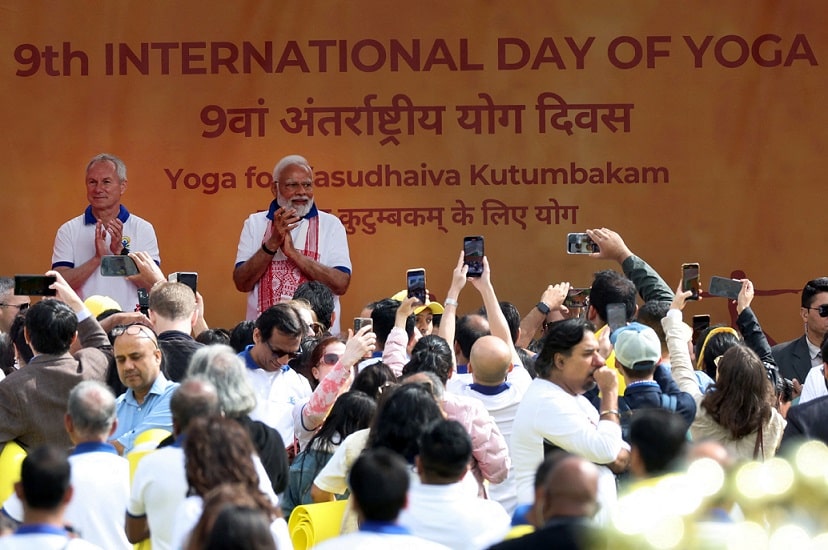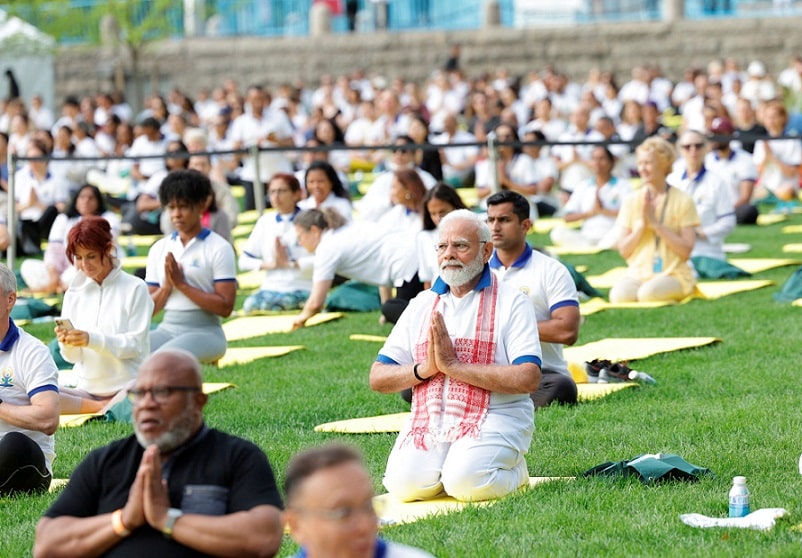Yoga: Karmasu kaushalam
That is, yoga is the efficiency of action. This mantra always teaches us that, by practising yoga, we gain the ability to become more capable in life. Even if we work with discipline and fulfil our responsibilities, it is still a form of yoga. Realising this mantra, India has made its identity as a soft power by globalising yoga, and by linking yoga with karma yoga, the power of development as an individual, society and nation has multiplied manifold.
The significance of the 9th International Day of Yoga has increased this year because India is presiding over the world’s most powerful economic group, the G20. Yoga has been specifically made a part of every G20 event, which is strengthening the identity of Indian civilisation…
Whether common or distinct, young or old, women or children, believers or atheists, Yoga has today become the identity of the body, energy, mind and spirit for people of all ages. Religion, sect, caste, rich-poor, across national boundaries, it has become one language for the entire world. Yoga holds a significant place in India’s ancient heritage, and work-oriented spirituality abounds in Indian culture. The practice of combining work and worship has long been a part of Indian culture. Yoga is no longer just a part of life; it is a way of life.

Indian Prime Minister Narendra Modi and United Nations General Assembly President Csaba Korosi participate in the 9th International Day of Yoga event at the UN headquarters in New York City, New York, US, June 21, 2023
After becoming Prime Minister in 2014, Narendra Modi created a separate Ministry of AYUSH, and took on the task of giving it a new global identity by combining Ayurveda with yoga and other traditional medical systems. Because of India’s efforts, the International Day of Yoga began on June 21, 2015. As a result of these efforts, yoga became an important means of disease prevention in India’s oldest and richest tradition, and the world recognised its power as well. India has become the pioneer of this civilisational identity due to the importance of yoga in preventing health-related problems in general.
Yoga is now becoming the mutual basis of global cooperation. Today, Yoga gives people hope for a healthy life. Yoga images, which were previously only seen in homes and spiritual centres, can now be found in every corner of the world. These images depict the growth of spiritual understanding as well as an innate, natural and shared human consciousness. Especially since the world has been dealing with the worst pandemic of the century, Covid, for the past two years. Even in these circumstances, beyond the borders of a country, island or continent, this enthusiasm for Yoga Day demonstrates human vitality.
Yoga has now become a global festival because it benefits humanity as a whole, not just individuals. This year, as the rest of the world celebrates Yoga Day, India celebrates the Amrit Kaal of its independence. It also presides over powerful economic groups all over the world, including the G20. In this context, widespread acceptance of Yoga Day represents acceptance of the Amrit spirit of India, which fuelled its freedom struggle. Yoga is now more than just a way of life; it is a way of life that has increased efficiency and productivity. That is why Prime Minister Narendra Modi says, “We should not take yoga as a side job. We must also be familiar with yoga and live it. We must both learn and practise yoga. We must also encourage the growth of yoga. When we begin to live yoga, Yoga Day will no longer be a celebration of yoga but of our health, happiness, and peace.”
Yoga’s global market expanding
Today is the day when the infinite possibilities of yoga can be realised. A large number of young people are developing novel ideas in the field of yoga. The Ministry of AYUSH also launched the ‘Startup Yoga Challenge’ which is a move in this direction. The AYUSH industry’s greatest strength is that there are various types of opportunities available for everyone.
In the field of AYUSH, for example, approximately 40,000 SMEs, or small-scale industries, are currently providing various products and undertaking various initiatives in India. These are extremely beneficial to the local economy. Eight years ago, the country’s AYUSH industry was worth only Rs 20,000 crore. While the AYUSH industry is currently worth approximately Rs 1.5 lakh crore, it will need to expand further in the global market in the coming years. India is prepared to fully exploit all of its potential. Hundreds of thousands of new jobs will be created for the youth as a result of this.
The world recognised the importance of our yoga
Another significant aspect of the growing popularity of Ayurveda is yoga tourism. Yoga is more than just exercise; it is a sense of being at one with oneself, the world and nature. Yoga raises our awareness by causing changes in our lifestyle.
Narendra Modi’s message on September 27, 2014, while taking the initiative to get yoga recognised on the international stage, was that hardly anyone would have imagined its importance would increase so much in the era of the Covid epidemic. This is why India gave the world the power of yoga, so during the Covid period, there would hardly be any head of state in the world who would not have mentioned the measures to win over Covid through yoga in his conversation with Prime Minister Modi.
The government of Prime Minister Narendra Modi worked tirelessly to have June 21 designated as International Day of Yoga. The 193-member United Nations General Assembly achieved a record consensus of 177 co-sponsoring countries. In its resolution, the United Nations General Assembly acknowledged that ‘Yoga offers a holistic approach to health and wellbeing’.
Yoga practice brings harmony to all aspects of life; thus, widespread dissemination of information on the health benefits of yoga practice to the global population would be advantageous. With this, a new era of holistic health revolution in India has begun, with a focus on prevention rather than treatment. When India proposed yoga at the United Nations, it set a record for the UN to pass the resolution with the most votes in the shortest time.
Human culture’s eternal heritage
It is a source of pride for Indians that there is now yoga from Dehradun to Dublin, Shanghai to Chicago, and Jakarta to Johannesburg. Yoga enriches every life in every situation, whether it is at the peak of the Himalayan mountains or the sun-baked desert. “When the forces of destruction dominate,” Prime Minister Modi says, “there is disintegration. Scattering happens between countries, individuals and societies. Walls are being built in society, family strife is increasing, and if a person is breaking down from within, yoga can help.”
Many new yoga institutes are emerging, and the need for yoga instructors has grown. Even in yoga institutions today, young people are preparing for a career by enrolling. Indian yoga instructors are in high demand in countries all over the world. Around the world, yoga has created a new job market. In all of this, India’s people remain the world’s first priority.
Efforts are also being made in India to scientifically standardise yoga and the yoga process throughout the world. Only a few years ago, Unesco designated India’s yoga as intangible cultural heritage. Yoga training is being implemented in organisations, schools and colleges all over the world. Today, many states in India have made yoga a venture of education so that future generations can become acquainted with this age-old science of ours, become practitioners, and make yoga a part of their lives.
Yoga: India becomes a soft power
Yoga’s global popularity has helped India establish itself as a soft power. The intellectual and cultural power (soft power) of a country reflects its society’s creative aspirations. The distinguishing feature of ‘soft power’ is that it is ‘soft’ because it is not controlled by the government. It was not that people did not practise yoga in other countries until 2014. However, after Prime Minister Narendra Modi inspired it to become an international festival and the United Nations declared an International Day of Yoga, it has been the only day on which the world’s largest cultural festival is celebrated.
Soft power is a country’s ability to shape its priorities. Apart from using force, it influences other countries’ behaviour towards itself through its appeal and charm. India has always believed in the use of soft power for the good of humanity. It also includes the ability to persuade others through persistence and positive charm, as well as the use of culture, values, implicit knowledge, spirituality and foreign policy. Participation and concern are central to Indian philosophy. Soft power encompasses all of a country’s characteristics that attract other people, communities or countries. For thousands of years, India has taken a holistic approach to health. We have a long history of health promotion and prevention. Yoga and meditation have evolved into global movements. Yoga is not just for individuals, but for all of humanity.
Yoga originated in India and is a technique that anyone can learn. The first International World Yoga Day was observed on June 21, 2015. After it was spearheaded by Prime Minister Narendra Modi, yoga is now recognised as an Indian power throughout the world. This is a gift to the world from India for the benefit of people.
The popularity of International Day of Yoga has made every citizen realise how important it is for all of us to be healthy in order to participate in every process and activity of nation-building. Yoga undoubtedly plays a significant role in this. There is little doubt that improved health care has increased life expectancy, which has accelerated India’s development. Karmayoga has evolved with increasing efficiency. The fact that an increase in average life expectancy of even one year increases the country’s GDP by 4 per cent demonstrates how important a healthy life is for the country’s economic health.






Click here to change your cookie preferences